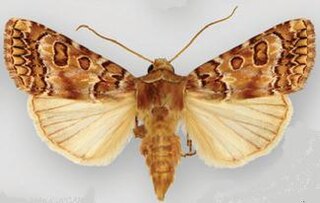
Hypotrix is a genus of moths of the family Noctuidae.

Hypotrix diplogramma is a moth of the family Noctuidae first described by William Schaus in 1903. It is found in southern North America from eastern Arizona and south-western New Mexico southward at least to Mexico City.

Hypotrix parallela is a moth of the family Noctuidae. It is found from south-western Colorado, southward through eastern Arizona, New Mexico, and western Texas to the State of Durango in northern Mexico.

Hypotrix rubra is a moth of the family Noctuidae. It is found from south-western New Mexico and south-eastern Arizona southward to the State of Durango in northern Mexico.

Hypotrix spinosa is a moth of the family Noctuidae. It is a very rarely collected species that is known only from south-eastern Arizona, south-western New Mexico, and the State of Durango in northern Mexico.

Hypotrix ocularis is a moth of the family Noctuidae. It is found from south-western New Mexico and south-eastern Arizona southward to Mexico City.

Hypotrix basistriga is a moth of the family Noctuidae. It is known only from the White Mountains and Pinaleño Mountains in eastern Arizona.

Hypotrix naglei is a moth of the family Noctuidae. It is known from east-central Arizona, south-eastern Arizona, south-central New Mexico and south-western New Mexico.

Hypotrix alamosa is a moth of the family Noctuidae first described by William Barnes in 1904. It is known only from the United States in south-eastern Arizona.

Hypotrix trifascia is a moth of the family Noctuidae. It is found from southern Utah and Colorado southward through Arizona, New Mexico, and western Texas to northern Mexico.
Hypotrix vigasia is a moth of the family Noctuidae. It is found in Veracruz in south-eastern Mexico.

Hypotrix optima is a moth of the family Noctuidae. It is found from south-eastern Arizona and central New Mexico southward to Mexico City.

Hypotrix hueco is a moth of the family Noctuidae first described by William Barnes in 1904. It is known only from south-eastern Arizona in the United States.

Hypotrix lunata is a moth of the family Noctuidae. It is found in the range of Arizona to northern Mexico.

Anhypotrix tristis is a moth of the family Noctuidae first described by William Barnes and James Halliday McDunnough in 1910. It is found from eastern Arizona and northern New Mexico southward in the Sierra Madre Occidental to the state of Durango in Mexico.

Protorthodes alfkenii is a moth in the family Noctuidae first described by Augustus Radcliffe Grote in 1895. It is found in North America from central Oregon, southern Idaho, central Wyoming and north-western Texas southward to southern Mexico. The habitat consists of open arid woodlands.
Homorthodes dubia is a species of cutworm or dart moth in the family Noctuidae. It was described by William Barnes and James Halliday McDunnough in 1912 and is found in North America.
Neleucania patricia is a species of cutworm or dart moth in the family Noctuidae. It is found in North America.

Lacinipolia triplehorni is a species of cutworm in the family Noctuidae. It is found in North America.

Tricholita chipeta is a species of cutworm or dart moth in the family Noctuidae. It was first described by William Barnes in 1904 and it is found in North America.









